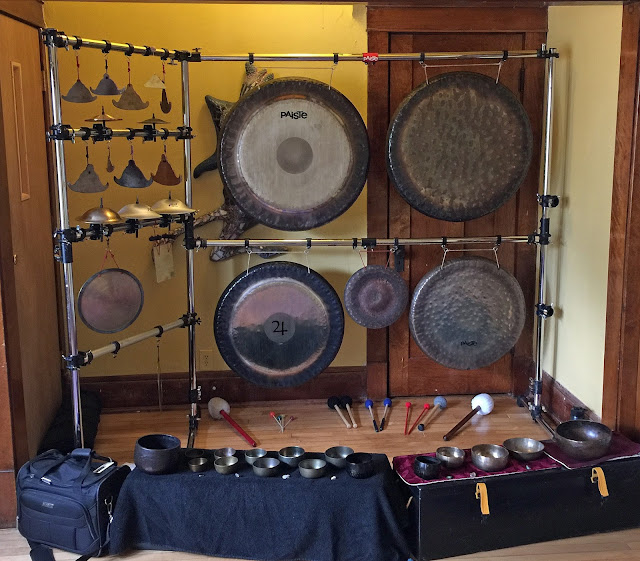The Zazen of Sound
zazen
/zʌzɛn/
noun
1.
(in Zen Buddhism) deep meditation undertaken whilst sitting upright with legs crossed
After writing assorted blog posts about the Zen of sound, various people have asked me about how they can get deeper into the sound, deeper into their own playing. So I've decided to offer some suggestions that have worked for me, but realize that each of us is different, so you will most surely find your own way.
Say Hello To The Sound
- Turn off your phone/computer/electric distractions.
- Make sure the kids, pets, other family members cannot disturb you.
- Make sure you are comfortable sitting or standing in front of your instrument/s. Because of my set up, I always stand.
- For a Gong, strike it gently in the center, getting a full, focused tone. For a Bowl or Bell, strike it gently on the side/edge to get a clear, yet pleasing sound. This exercise is not about loudness.
- Listen to the sound as it fades away.
- Be patient and let the sound fade completely away.
- When you feel you have waited long enough, wait a bit longer.
- Then strike the Gong/Bowl/Bell again, repeating the listening and waiting above. Make each strike consistent and like the last.
- Through all of this, be aware of any other sounds, like your heart beating, your breathing, your nervous system humming, any room sounds or outside sounds, such as traffic, jets, or dogs barking. Let these sounds blend in and become a part of your practice.
- Keep breathing and be aware of your breath—don't hold it.
- When you listen, don't focus on the sound as much as let the sound become a part of you.
- Listen with your ears and your body. You can feel the vibrations as much, or more, than hearing them.
- Each time you play a sound, try to wait just a bit longer before playing the next sound.
- If you have more than one instrument, alternate playing them.
If something is boring after two minutes, try it for four. If still boring, then eight. Then sixteen. Then thirty-two. Eventually one discovers that it is not boring at all. - John Cage
Learning to listen and experience sound is no different from any other activity. You need to do this everyday for 10, 15, or more minutes. A big part of this is developing a relationship with sound/your sounds, and a trust in both you experiencing things, and in your abilities to play and control your instruments. It's important that if you hear a sound you like, that you can recreate it at will.
Other benefits of this exercise are learning to control your stroke each time you play your instrument/s. I spend a lot of time playing my instruments in different spots with different mallets in order to learn about how many different sounds I can create and, most importantly, what sounds I can use. It's important to me to be able to recreate these sounds as needed when playing for others. It's too easy to let yourself go with just one, basic sound.
There are no shortcuts to getting a good sound.
It's also important to learn how your instrument/s respond to your touch. Two different people playing the same instrument will most likely bring out different sounds, because they each have a different touch, different approach. You need to work at learning your touch and how your own personal instruments react to that touch.
Rainer Maria Rilke
GONG
No longer for ears . . . : sound
which, like a deeper ear,
hears us, who only seem
to be hearing. Reversal of spaces.
Projection of innermost worlds
into the open . . . , temple
before their birth, solution
saturated with gods
that are almost insoluble . . . : Gong!
Sum of all silence, which
acknowledges itself to itself,
thunderous turning within
of what is struck dumb in itself,
duration pressed from time passing,
star re-liquified . . . : Gong!
You whom one never forgets,
who gave birth to herself in loss,
festival no longer grasped,
wine on invisible lips,
storm in the pillar that upholds,
wanderer's plunge on the path,
our treason, to everything . . . : Gong!
Rainer Maria Rilke
~ MB
Chop Wood / Carry Water / Play Gongs™






Comments
Post a Comment